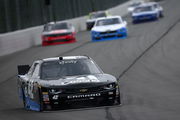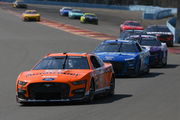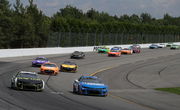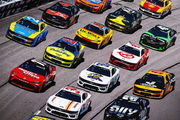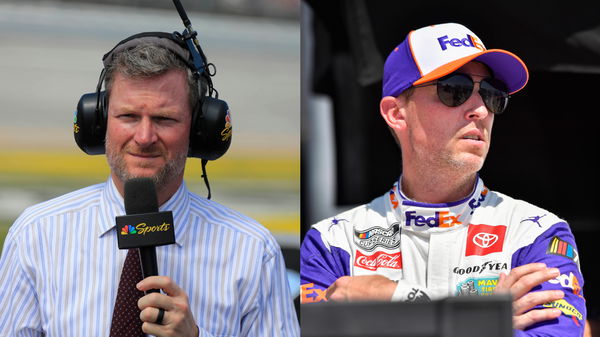
via Imago
Dale Earnhardt Jr and Denny Hamlin | Image Credits: Imago

via Imago
Dale Earnhardt Jr and Denny Hamlin | Image Credits: Imago
Despite making strides in terms of overall driver safety and a great race package boasting a number of track layouts, there’s been constant criticism about NASCAR’s failure to meet the community’s expectations. Amidst the organization’s efforts to improve its speedway and road course packages, it has strayed away from the short format of racing that was, is, and will continue to be the sport’s bloodline.
While the introduction of the 7th generation Next-Gen cars was a leap in the positive direction, the sanctioning body’s stance on short-track racing has garnered quite a backlash from the community, including some of the sport’s greatest drivers. Especially considering how the short track package has been with the modern Next-Gen platform.
The sanctioning body’s efforts to expand its palette with more road-focused products to meet its younger fanbases’ liking might be one of the several factors that contribute to this distressing trend. But if one is to look a little bit deeper into the recent developments, things are a bit muddy can get a bit too muddy for one’s liking, especially if one is a traditional oval enthusiast who adores the short format of exciting action.
ADVERTISEMENT
Article continues below this ad
So let us take an in-depth analysis on the topic here and consider some of the organization’s reasoning while considering the drivers’ take on it to understand why NASCAR might be shooting itself in the foot.
NASCAR and its controversial moves that agitate the traditionalists of the sport
For one, let us not put the blame fully on NASCAR. Why, you may ask? Well, the organization has its reasons to believe that they’re not the only ones in on this. A few decades back, when NASCAR was in its glory days, short-track racing was the thing. The organization’s short, fast, and exciting format was its top product, with fans yearning for races on half-a-mile tracks like Martinsville and Richmond.
However, fast format a few years and we now have a handful of short-track venues in the schedule. After its prime years of entertaining fans, NASCAR’s ambitions grew bigger, eyeing to attract an international audience. At the same time, the sanctioning body’s inability to see the fans’ pleas for improving the short-track format went unnoticed. Eventually, the whole format fell out of place, with the organization opting to go with more road-focused layouts.

USA Today via Reuters
Apr 16, 2023; Martinsville, Virginia, USA; NASCAR Cup Series driver Daniel Suarez (99) and NASCAR Cup Series driver Ryan Preece (41) lead the pack to a restart during the NOCO 400 at Martinsville Speedway. Mandatory Credit: John David Mercer-USA TODAY Sports
Now only a handful of short tracks remain on the schedule, including the ones mentioned above and Bristol. Amidst all this, the organization’s effort to earn the purists’ liking has now deepened the problem. Wondering how? The main issue the organization is facing currently is how to incorporate its Next-Gen platform into the short format that the fans yearn for.
With the introduction of the new racecars, passing on such short ovals has become the new issue. By reducing the downforce on the 7th generation cars, the cars have now become very similar to each other, giving drivers another headache to deal with. From being one of its best products, Short-track racing has become a vulnerability for the organization.
Even after continued testing and developments of the Next-Gen and short-track package, it hasn’t reached its mark considering how competitive the racing was back in the day. Senior and former drivers have been public about it including Joe Gibbs Racing‘s Denny Hamlin and JR Motorsports co-owner, Dale Earnhardt Jr.
WATCH THIS STORY: Jeff Gordon’s take on Denny Hamlin’s “villain” persona
Trending
Denny Hamlin addresses the elephant in the room, sharing his take bluntly
Being one of the outspoken drivers in the current roster, Hamlin gave out his take a few months ago. The JGR veteran did not shy away from making his point bluntly, but when asked about Iowa Speedway’s return to the 2024 schedule, Hamlin pointed out the main issue that NASCAR needs to tweak before it adds more venues.
"We've continued to cut horsepower. The grip on the car at short tracks is a byproduct of having wider tires and less horsepower. In a cost cutting measure we've continued to cut horsepower, which has led to shifting … and has made the racing bad." pic.twitter.com/j8FOrtlOm0
— Matt Weaver (@MattWeaverRA) October 5, 2023
Aside from reducing the downforce on its cars, the organization’s move to decrease the horsepower in the Next-Gen car doesn’t sit well with Hamlin. Hamlin, being Hamlin, said, “We’ve continued to cut horsepower. The grip on the car at short tracks is a byproduct of having wider tires and less horsepower. In a cost-cutting measure, we’ve continued to cut horsepower which has led to shifting and it’s led to less power and more grip on the short tracks, which has made the racing bad.”
And guess what? Hamlin hasn’t been the single driver to mention this problem. During the 2day testing of the cars a few months ago in Richmond, Hamlin’s teammate, Christopher Bell, and SHR driver Ryan Preece also sided with the veteran when Preece openly said, “I could tell much of a difference from my car yesterday to today so, not what we were hoping for, didn’t feel much of a difference.”
Whereas Bell did not resort to putting it out there as Hamlin did, he minced his words, saying, “This did not feel like a big difference. … I applaud NASCAR for trying. It’s cool [to see the pieces] but I didn’t notice anything.” While NASCAR is trying to get back on its short track format, even after repeated testing, the output is pretty much the same with the cars being underpowered on the short tracks.
With the organization trying its luck to improve on the short format that is in its bloodline, Dale Earnhardt Jr also chimed in with his take, reacting to NASCAR’s testing phase in New Hampshire a couple of months back.
Dale Earnhardt Jr lets us in on his take, resting his hopes on new-generation drivers
For one, the organization’s shortcoming on this front is its Next-Gen platform is no big secret. With the fanbase publically calling out the organization and urging it to look into the matter, NASCAR has gone back to the drawing board with rigorous testing, trying to make amends for the Next-Gen’s flaws.
Following the Crayon 301 in NMHS in July, a team of 6 drivers was called upon to test the race cars on short tracks. The six included Bell and Preece. Giving his take on his popular Dale Jr Download podcast, the veteran believes that the changes are certain to take time even if NASCAR figures out the root cause of the issue.
He said, “I think William Byron, Ryan Preece, Christopher Bell, a couple of other guys are going to be testing this package together. It’s about six and I said, ‘Hey, the future of short track racing and big league stock cars is on ya’ll shoulders. If ya’ll don’t come out of here with an answer, we’re screwed.’ We are.”
ADVERTISEMENT
Article continues below this ad
The JRM co-owner also mentioned how things will be back to square one for the seasons to come if they can’t resolve Next-Gen’s issue on the short tracks. The 2-time Daytona winner also reiterated the importance, saying, “You need to test and be thinking like, what is going to help out cars put on the best race when we go to a short track.”
While Dale Earnhardt Jr pointed out the sacrifices drivers have to make for the sport, “The King” Richard Petty also isn’t much of a fan of NASCAR’s progression on this front. Known for his capabilities and his exceptional track record on short tracks, especially in Martinsville, Petty hopes that the organization can soon identify and work on the issue.
ADVERTISEMENT
Article continues below this ad
Closing notes – NASCAR’s major short-track hindrance
For the most part, the Next-Gen car’s arrival can be attributed to the distressing problem NASCAR has at hand. The Supercar-like handling of the new cars makes them very different from the older generation cars that took on the short tracks. Now with the organization cutting down the power figures and tweaking the aero suitable for road courses and high-flowing speedways, NASCAR is caught in the crossroads.
An unsettling position that no promotion wants to be in is to resolve the issue with its core product and get back the traditionalists and hard-core fans that made the sport it is today while keeping its younger fans engaged with newer formats.
ADVERTISEMENT
ADVERTISEMENT
ADVERTISEMENT
ADVERTISEMENT


